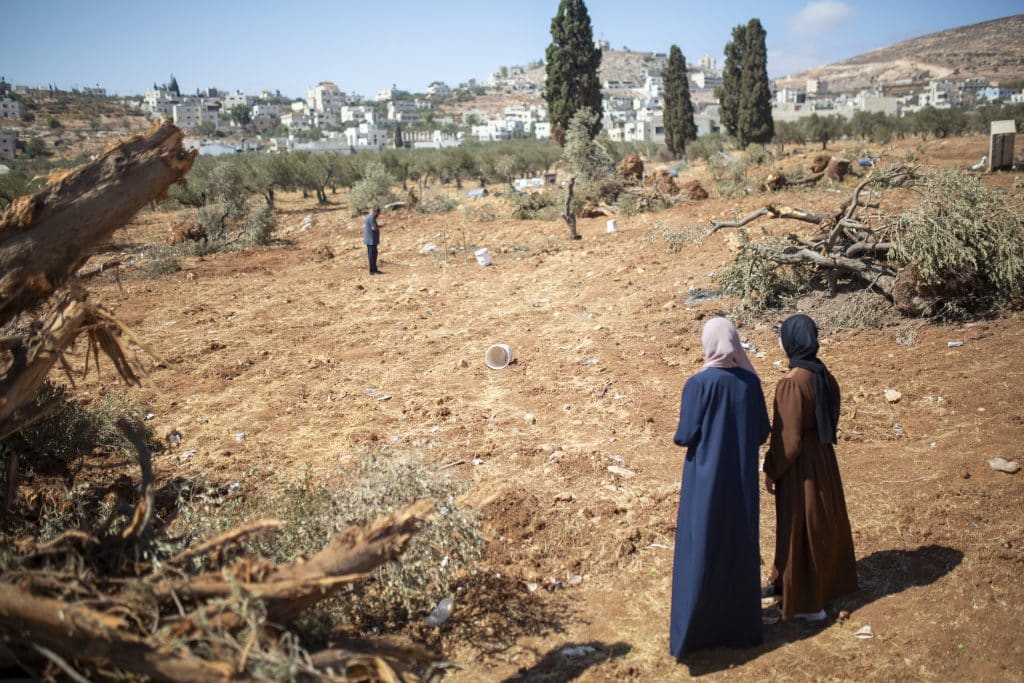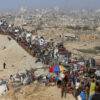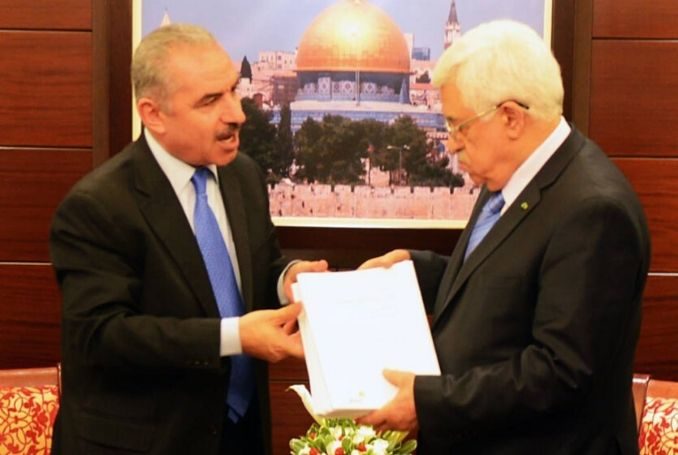Israel just decimated the olive groves of the Palestinian village of Mughayyir, northeast of Ramallah, where olive oil production is an important part of the yearly income of most families. The Israeli army had imposed a curfew on the village last Thursday and began to search homes, arresting an unspecified number of Palestinians, including the village mayor, Ameen Abu Alia, over the course of three days. The siege on al-Mughayyir came following reports that an Israeli settler had been attacked near the village, after which the Israeli army’s bulldozers uprooted some 10,000 olive trees in the eastern plain of the village, according to the local farmers’ association. Some of the trees were up to 100 years old.
The Israeli army said that the curfew and destruction of the village’s farmland were aimed at capturing the attacker, but Israeli daily newspaper Haaretz quoted the Israeli army’s central command chief saying that “uprooting the trees was intended to deter everyone. Not just this village, but any village that tries to raise a hand against the [Israeli settler] residents.” The Israeli commander reportedly said that “every village should know that if they commit an attack, they will pay a heavy price and will be under curfew and surrounded.”
The village of Mughayyir has been in the crosshairs of the Israeli army and settlers for at least two years. Since October 2023, Israeli settlers have attacked Mughayyir multiple times, with the largest attack taking place in April 2024, during which settlers damaged farming barracks and homes, and killed one Palestinian who was defending his home from his rooftop. The Israeli army increasingly restricted the villagers’ access to their farmlands, especially their eastern olive crops, eventually making the entire eastern plain of the village inaccessible for Palestinians.
The village overlooks the slopes of the Jordan Valley right next to the Israeli Allon road — established in the early 1970s — that cuts across the eastern part of Palestine from north to south, running parallel to the edge of the Jordan Valley. Since 2019, the Israeli government has declared its intention to annex the entire area east of the Allon road, including all of the Jordan Valley.
Israeli settlers have ramped up their attacks on rural Palestinian communities in these areas since October 2023, expelling dozens of Bedouin families and emptying the area of any Palestinian communities. In recent months, Israeli settlers and the Israeli army have concentrated on harassing the villages adjacent to the Israeli road, restricting Palestinians’ movement and access to their lands.
Livelihoods uprooted
“At around 8:30 in the morning, the occupation army entered the village and imposed a curfew, and then they began to go into homes and search them,” Fayez Jabr, a farmer and villager in al-Mughayyir, told Mondoweiss. “Some homes were searched three or four times, and the occupation army arrested many young men and the mayor. Meanwhile, the occupation’s bulldozers went on to uproot olive trees in the eastern plain.”
“They uprooted thousands of trees in an area of four square kilometers, which represents up to half of Mughayyir’s olive production,” Jabr continued. “All the families of the village have been affected.”
Jabr added that the Israeli army also destroyed olive crops in other parts of the village’s farmland. “Four months ago, they uprooted 80 olive trees belonging to me and my cousin in the west of the village,” he said, indicating that the Israeli army confiscated farmland in the southern part of the village to construct a new settler road meant to connect to a settler outpost that had been recently established over a children’s park belonging to the village.
“Our farmlands in the south of the village were confiscated, and we have restricted access to farmland in the west,” Jabr detailed. “The most important farmland in the eastern plain has now been bulldozed.”
Jabr noted that the only olive trees left for the villagers were in the immediate surroundings of the village, around and between houses. “Before October 2023, my family and I used to make up to 80 tanks of olive oil, 16 liters each,” he reflected. “But in the past two seasons, we barely made 10 tanks.”
With the annual olive harvest less than two months away, the destruction of such a vast number of olive trees will impact an already struggling local industry. “We’ll be lucky if we make two tanks this year,” Jabr said.
The Israeli army’s ramping up of attacks on Palestinian farmland in the West Bank has escalated alongside the increasing expansion of Israeli settlement plans. Last week, the Israeli government approved the building of new settler neighborhoods in a strategic tract of land in the West Bank east of Jerusalem, known on Israeli maps as E-1. The plan is part of Israel’s larger objective of separating the north and center of the West Bank from the south to erase the territorial contiguity of a potential Palestinian state, including through a recently approved infrastructure project that would redirect Palestinian movement in the E1 area through a network of tunnels.
The E-1 settlement plan would see the connection of the illegal Israeli settlement of Maale Adumim to Jerusalem, expanding Israeli settler presence between Jerusalem and the Jordan Valley, and effectively splitting the West Bank in two. According to Israeli finance minister Bezalel Smotrich, the plan would “erase the Palestinian state with actions, not words.”
Meanwhile, Israeli settlers have been increasing their attacks against Palestinians across the West Bank. According to the UN Office of Coordination of Humanitarian Affairs (OCHA), “the monthly number of Palestinians injured by Israeli settlers more than doubled in June and July 2025 (about 100) compared with an average of 49 per month between January and May 2025 and 30 per month in 2024.”
Since October 2023, Israeli forces and settlers have killed at least 1,000 Palestinians in the West Bank, while Israeli forces have arrested more than 10,000.
By: Qassam Muaddi
Source: Mondoweiss








